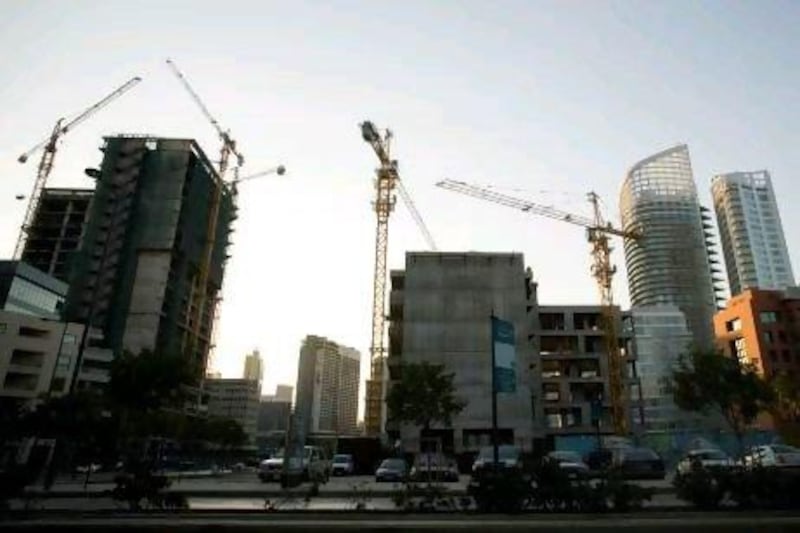The Beirut property boom continues unabated. The 50-storey Sama Beirut, at the top of my road, is taking its ominous shape, while another, smaller new development in the adjacent street also grows taller by the day. Three months ago, there was sky between the most recent floor and the top of my window frame. Now my view is one of dull concrete shrouded by green netting and scaffolding. Vistas change from month to month, as do the dozens of hoardings that promise a new lifestyle: "paradise on earth" and "dream getaways in the city" all painting the picture of urban living to which we are told we must aspire.
Meanwhile, the Lebanese have just marked the anniversary of the outbreak of Lebanon's 15-year civil war on April 13, 1975. Back then, Beirut was also riding high on its reputation as a vibrant Arab capital, poised to enter what it believed would be a period of even greater prosperity.
My father told me that he never thought the civil war would last as long as it did. "The lira was practically a hard currency," he would say. "Why would we want to throw it all away?" Why indeed? I can't help feeling that we might be suffering from the same hubris that led to that terrible era of bloodshed.
Ironically, on the anniversary of the outbreak of that war, The New York Times published yet another feature on Beirut and its impossibly glamorous residents. The writer, Anne Barnard, was particularly taken with the women wearing "fire-engine-red lipstick", "forever extracting their spike heels from the cracks" in the boardwalk of the new Zaytouni Bay marina development. She describes Beirut as an "eddy of peace" in a turbulent region where the Iraqi and Syrian diaspora had flocked to set up shop, because Beirut was where they could get things done.
The same occurred in the early 1950s, when Beirut became a sanctuary for émigrés, spies, bankers and chancers of every stamp after Gamal Abdul Nasser's Arab nationalism and the creation of the state of Israel. But then we had the 1969 Cairo accord, which allowed the Palestine Liberation Organization (PLO) to attack Israel from Lebanese territory, a state of affairs that polarised the nation. After that, our fate was sealed.
Today, amid the veneer of conspicuous consumption, we have similar tensions, this time between the Sunnis, who are angered by the treatment of their own in Syria, and the Shia, who, wittingly or not, find themselves tarred with the brush of the Hizbollah, Syrian and Iranian axis. This time around, the Christians are not even in the game.
It is explosive stuff, and yet the private sector ploughs ahead as it always has done, aware that there are no guarantees that stability will prevail just because new residential towers are thrown up and a few dozen, half-decent motor yachts are moored in front of the old Hotel St Georges.
But back to the property boom. According to a report issued by Credit Libanais bank based on data from the national land register, the average property price in Beirut increased to $508,709 (Dh1.8 million) in the first two months of this year, up from last year's average of $456,018 and way more than the 2006 average of $229,332. The report tells us that just under 2 per cent of buyers are foreigners, which goes some way to debunk the idea that Gulf Arabs are still buying up Beirut.
"We are Lebanese," a local IT entrepreneur told me six months ago when I asked him whether the Arab Spring made him nervous. "We cannot stop working, war or no war, internal crisis or no internal crisis. We have learned to just carry on and hope for the best. This is why I still put my money in property in this town. Where else do you want me to live?"
Michael Karam is the associate editor in chief of Executive, a regional business magazine based in Lebanon
twitter: Follow our breaking business news and retweet to your followers. Follow us





